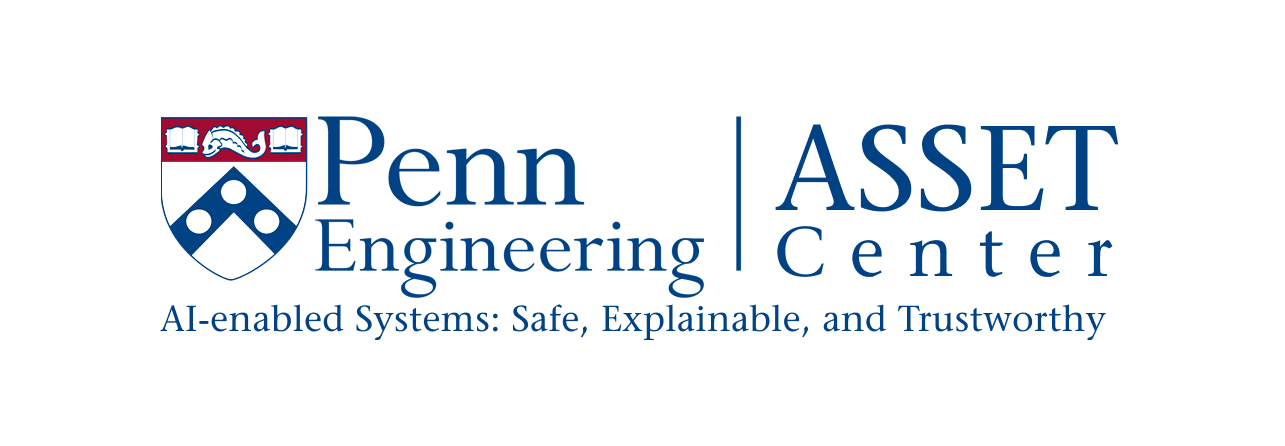ASSET & Warren Center Research Mixer
The ASSET and Warren Center will be hosting a research mixer to welcome new PhD students and expose new and current students to the wide range of research in Penn Engineering in AI/ML. The program will consist of (short) faculty talks, poster presentations by students/postdocs, and a reception to end the night!
Date
Friday, September 20th
Time
1:00 - 6:00 pm
Location
Singh Center for Nanotechnology
Event Schedule
1:00 – 2:30 pm: Faculty Talks – Session Chair: Michael Kearns
1:05 pm: Osbert Bastani (Computer and Information Science) “Neurosymbolic Learning with Large Language Models”
1:20 pm: Greg Ridgeway (Criminology/Statistics and Data Science) “Which police officers have a high propensity to escalate force?”
1:35 pm: Aaron Roth (Computer and Information Science) “What Makes Predictions Trustworthy?”
1:50 pm: Eric Wong (Computer and Information Science) “Convincing Experts to (not) Trust ML Models”
2:05 pm: Alejandro Ribeiro (Electrical and Systems Engineering) “Learning under Requirements: Supervised and Unsupervised Learning with Constraints”
2:15 pm: Pratik Chaudhari (Electrical and Systems Engineering) “Why Can We Learn?”
2:30 – 3:30 pm: Student Posters and Refreshments
Alaia Solko-Breslin “Data-Efficient Learning with Neural Programs”
Artemis Panagopoulou “A Framework for Aligning Image, 3D, Audio, Video to LLMs and its Emergent Cross-modal Reasoning”
Anton Xue and Avishree Khare “Logicbreaks: A Framework for Understanding Subversion of Rule-based Inference”
Bowen Jiang “A Peek into Token Bias: Large Language Models Are Not Yet Genuine Reasoners”
Christopher Watson “PLESL: Policy Learning with Example-specified Landmarks”
Hancheng Min “Can Implicit Bias Imply Adversarial Robustness?”
Jiancong Xiao “On the Algorithmic Bias of Aligning Large Language Models with RLHF: Preference Collapse and Matching Regularization”
Kaustubh Sridhar “REGENT: A Retrieval-Augmented Generalist Agent That Can Act In-Context In New Environments”
Kunhao Zhong “Improving CNN for Cosmological Maps”
Minsu Park “Dimensionality Reduction Techniques for Staistical Inference in Cosmology”
Oscar Xu “Initializing Models with Larger Ones”
Siming He “From NeRFs to Gaussian Splats, and Back”
Stephen Mell “LLM Composition with Automatic Parallelization and Streaming”
Tianjiao Ding “Parsimonious Representations in Modern AI”
Weiqiu You “Sum-of-Parts: Faithful Attributions for Groups of Features”
Xiang Li “Optimal Robust Detection for Gumbel-Max Watermarks Under Contamination”
Yangxinyu Xie “Debiasing Watermarks for Large Language Models via Importance Sampling”
3:30 – 5:15 pm: Faculty Talks – Session Chair: Rajeev Alur
3:35 pm: Mayur Naik (Computer and Information Science) “Trustworthy AI for clinical decision making”
3:50 pm: Bhuvnesh Jain (Physics and Astronomy) “Galaxy images and cosmic maps: how to extract three key numbers and test theories”
4:05 pm: Richard Berk (Criminology/Statistics and Data Science) “Using AI to Forecast Extreme Heat Waves”
4:20 pm: Dinesh Jayaraman (Computer and Information Science) “How to Train Your Robot”
4:35 pm: René Vidal (Electrical and Systems Engineering) “Foundations of Robust and Interpretable AI”
4:50 pm: Rahul Mangharam (Electrical and Systems Engineering) “Multi-Agent Dynamic Games: Balancing safety and performance at the limits of dynamics”
5:05 pm: Hamsa Bastani (Operations, Information and Decisions) “AI Deployments for Social Impact”
5:15 – 6:00 pm: Reception
Please join us for snacks and beverages to end the night!
